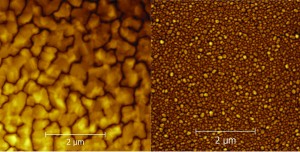Imagine pressing a button that converts the window in your living room into a flat screen TV. This technology may seem straight out of a science fiction movie, but it could be possible in the near future. Kenneth Chau, an associate professor at the University of British Columbia, is heading a group of researchers who recently discovered a method to both enhance the amount of light coming through a window and allow the glass to conduct electricity, facilitating the creation of novel technologies.
Previously metal was incorporated into some windows to improve their ability to reflect heat, but these researchers were the first to coat the window’s surface with metal. Unexpectedly, these thin sheets of metal not only gave glass the ability to conduct electricity but also increased the amount of light capable of passing through it.
“It’s been known for quite a while that you could put glass on metal to make metal more transparent, but people have never put metal on top of glass to make glass more transparent,” said Loïc Markley, a collaborator on the project, in an interview with Science Daily.
It may seem counter-intuitive that glass becomes more transparent when coated with metal, a highly reflective material. However, the laws of electromagnetism support the researchers’ empirical findings. Plastic is a dielectric substance, meaning that it is a poor conductor of electricity. According to Maxwell’s equations, the path for light to pass through a thin glass layer becomes shorter when a layer of metal is added. Since light’s path is shortened, the metal-dielectric bilayer is more transparent than the dielectric layer alone.

At the University of British Columbia, researchers aimed to prove this theory by coating sheets of glass with thin membranes of silver. Magnetron sputtering, a process used to deposit materials onto a surface, was used to apply a thin layer of silver onto the silicon nitride (glass) membrane. In magnetron sputtering, positively charged ions of plasma—a state of matter including electrically conductive gases— are attracted to a target substance of opposite charge. This attraction results in extremely thin films of plasma on the target substance, only eight to fifteen nanometers thick— a length that is over 5000 times thinner than a sheet of paper.
The researchers conducted trials to test whether certain configurations of silver-coated glass transmitted more light. An optical spectrometer, a tool that measures light intensity versus wavelength, was used in each trial to measure the glass’s ability to transmit light. After many trials, Professor Chau and his team were able to increase light transmission by up to six percent, but only in the blue portion of the visible light spectrum. There was no difference in transmission between glass coated by metal on one side and glass coated on both sides. According to the research team, light transmission could be further increased if scientists could create even thinner, perfectly flat films of silver.
Future research will attempt to use the results of this experiment to create “smart windows.” These technologies will depend on the ability to find glass that can conduct electricity while maintaining transparency. Not only could windows be used as touch screens, televisions, or thermostats, but they could also be used to improve household energy efficiency. If windows could transmit more light and heat, the need for artificial lighting and heating in houses would decrease, minimizing energy usage while maximizing comfort.
When asked about his future goals, Chau responded, “I am hoping to create a multi-disciplinary research facility—consisting of physicists, chemists, electrical and civil engineers, and psychologists—to advance smart window technology and examine the impact of smart windows on buildings and people.”
Chau hopes that someday, we will think of glass as the adaptive skin of a building, able to chage its transparency in response to weather conditions and user settings. In the near future, you may be able to control a room’s temperature by changing the settings on your window.
